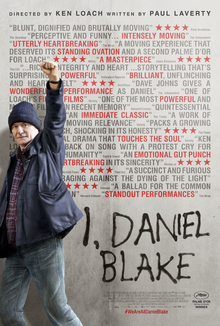
This one was another recommendation from our cinephile friend and given his leftist sympathies, it’s not hard to see why he wanted us to watch this. British director Ken Loach is quite well known and has made a career out of making films like this but I don’t believe I’ve ever watched any of them. After watching this one however I can see that the director means well but I’m not sure that I can agree with his cause.
Daniel Blake is a 59-year-old carpenter living in Newcastle who, having suffered a heart attack at work, has been barred from employment by his doctor. With no income, he applies for employment and support allowance but his case worker, applying a strict assessment formula, rules that he is fit to work. He is advised to apply for a jobseeker’s allowance instead which obliges him to look for work even though he can’t actually accept a job. While being run around by the bureaucracy, Daniel notices the plight of Katie Morgan, a young single mother from London who has been assigned to a council house in Newcastle after being evicted from a hostel. He speaks up for her and later helps her settle in. Both however run into intractable problems. Daniel is sanctioned for not being to provide sufficient proof that he is actively looking for a job and Katie is unable to find a job that she qualifies for at all. The lack of money drives both of them to desperation though they are still too proud to beg for charity.
The film is well made and the performers are excellent. I particularly like that it manages to avoid being overly dramatic for the most part. During its inevitable I, Daniel Blake protest scene it does feel a bit odd to have a passerby come out of nowhere and start chanting his name but at least the film is realistic enough not to go further than that. I also like that it manages to capture exactly how bureaucracies can be horrible to properly navigate and why the government has a strong incentive to deliberately make it that way. But at its heart, this simply isn’t a film that resonates much with me and I suspect that most Asians will feel the same way that I do.
The film’s central thesis is that the UK is a rich country and the state has an obligation to provide for all of its citizens. Consequently it is shameful how budget cuts by the ruling Conservative party has led to the diminution of social welfare services, leaving many citizens in a humiliating state of penury. To most of us in Asia however it is quite a step to assume that governments owe a living to citizens at all. It is quite shocking that Katie is assigned council housing essentially for free. It feels therefore quite silly that she is hung up over a tile dropping from a kitchen wall as she is cleaning up. I also find it rather unbelievable how a skilled tradesman like Daniel could have worked for 40 years and not have any kind of savings to get him through some hard times. It would have helped if it had been explained that his now deceased wife’s prolonged illness had drained his resources but I think part of the film’s point is that it shouldn’t matter: British citizens in dire need are owed assistance from the government no matter how they came to be in that situation.
A further simplification is that the film vilifies the bureaucracy and the government but tries to get across the message that most ordinary citizens are decent and helpful. This ignores the fact that the UK is a democracy and it’s at least arguable that cuts to social spending are popular among the public because many people are resentful of welfare beneficiaries who are perceived as sponging off of the system. Benefits that Daniel and Katie rely on and that the film argues they deserve simply for being citizens are ultimately paid out of taxes imposed on everyone else. It is therefore a little ironic that the film also celebrates the ingenuity of Daniel’s neighbor, China, who is most definitely not Chinese, in making money by smuggling in bootleg copies of sneakers from China, the actual country, and selling them on the street. Presumably in doing so he also evades paying the usual customs and excise duties and income and sales tax.
All this makes me sound like my old, heartless, capitalist self. It may be hard to believe from this post but I believe I’ve moved significantly leftwards in my views over the years. I do support spending on social welfare, not because it’s owed to the citizens, but because it the decent thing to do, research has shown that such spending is a net economic benefit and because the cost of such programs pales in comparison to the rents that the ultra-rich are able to unfairly extract from the economy. Still, I find it difficult to like this film for its simplistic street-level view of things. Plus, yes, living in Malaysia as I do, I’ve seen true poverty and it’s a little laughable how even the awful conditions depicted here don’t seem that bad in comparison.